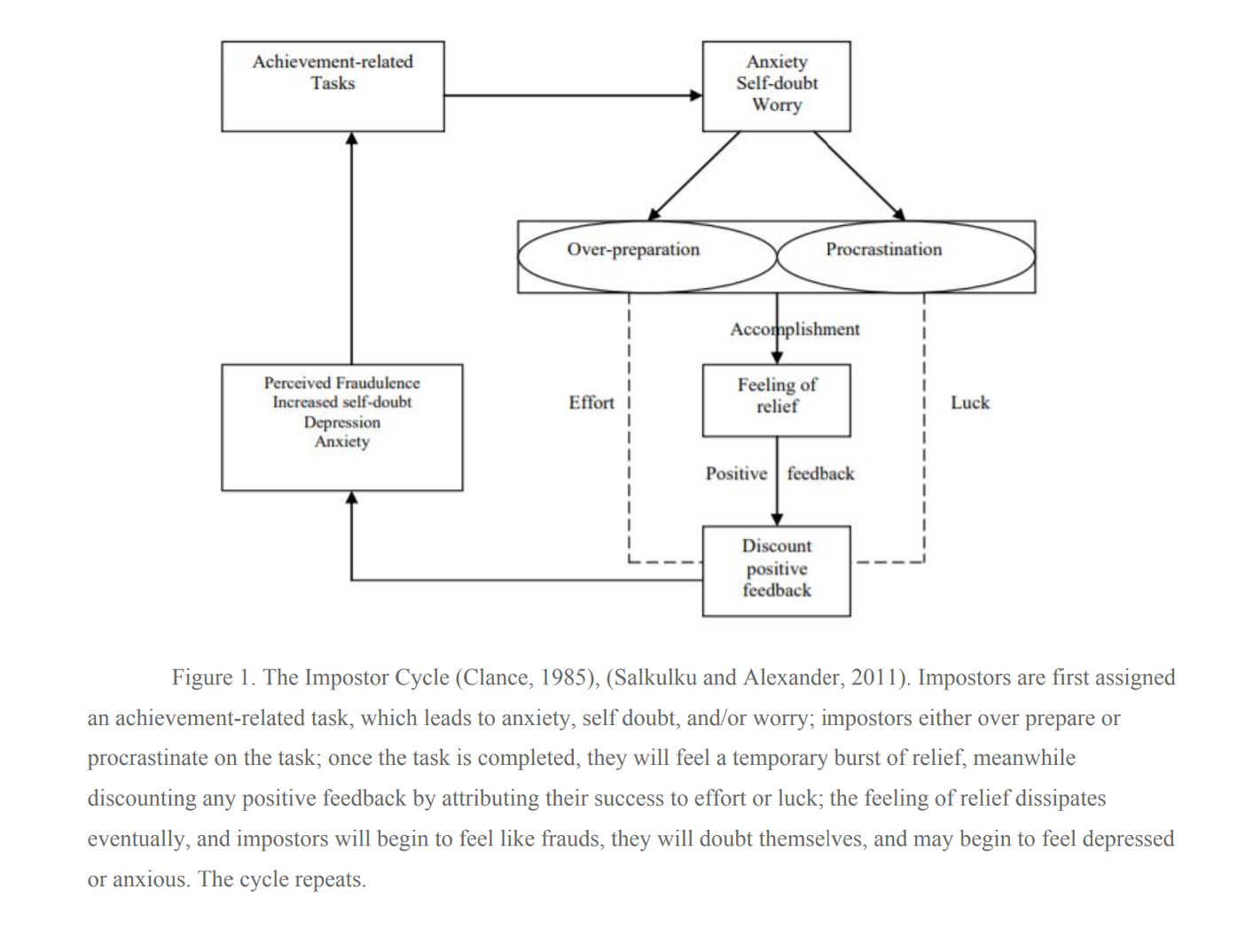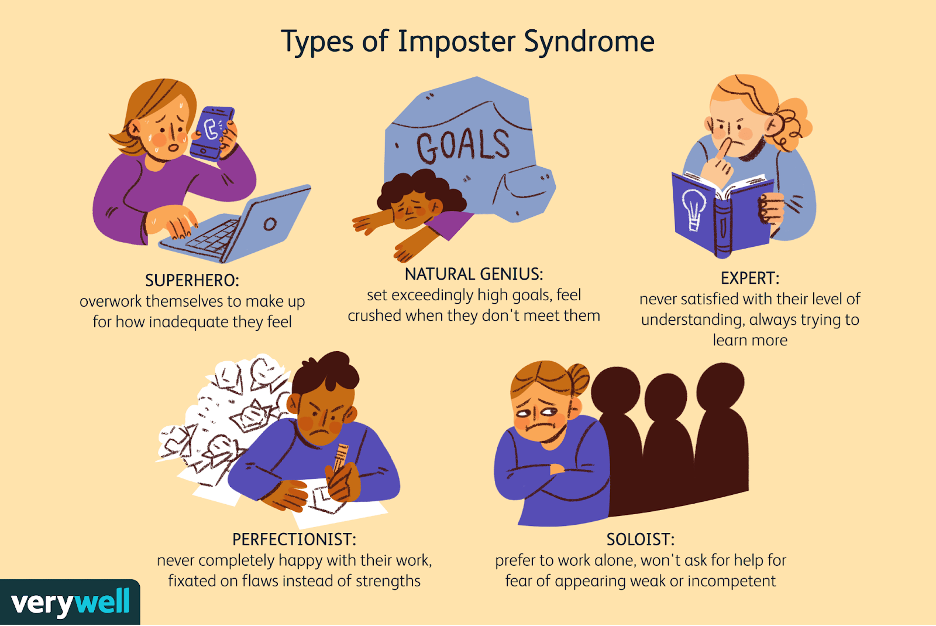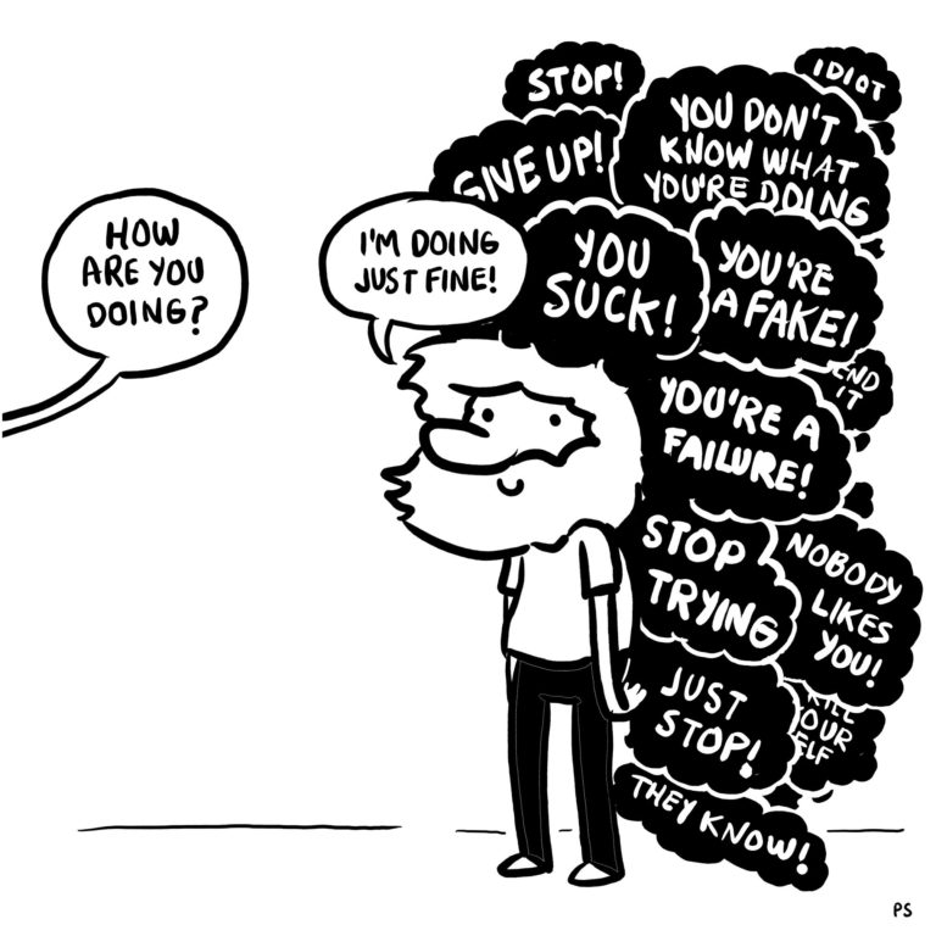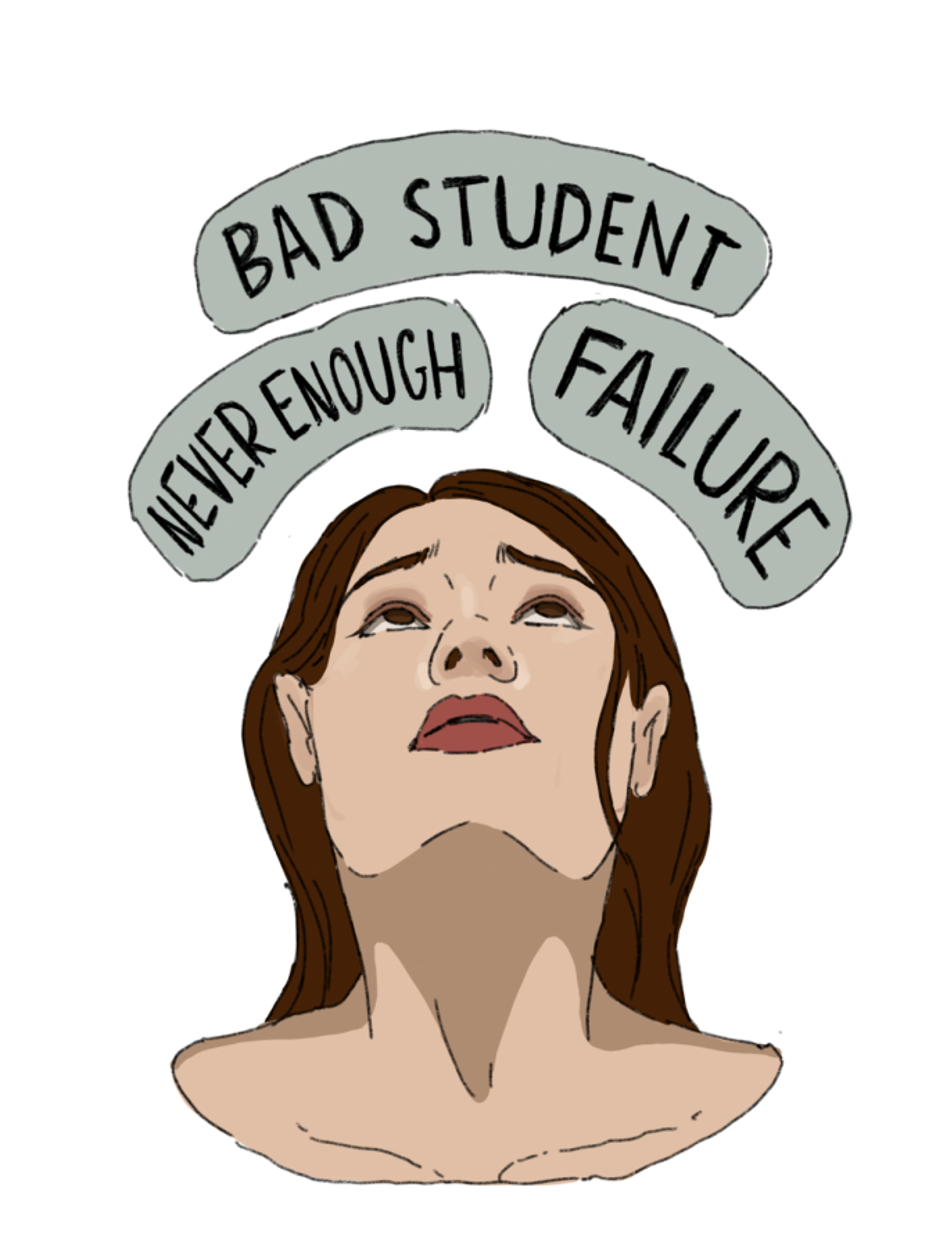
Imposter Syndrome
Do you feel like an Imposter? Imposter Syndrome: Internalized doubts and fears of achievements
Author(s): Mariame Fofana, MD and Ava Pierce, MD
Editor: Cassandra Bradby, MD
Definition(s) of Terms
Starting with a common understanding of key words, phrases, and potentially misunderstood related terms in DEI discussions helps ensure that all participants feel informed and welcome to participate in the discussion. Some terms have multiple definitions provided to help highlight nuances in the definitions.
Impostor syndrome (IS): is a psychological pattern in which an individual doubts their skills, talents, or accomplishments and has a persistent internalized fear of being exposed as a "fraud"(1). Despite external evidence of their competence, those experiencing this phenomenon remain convinced that they are frauds and do not deserve all they have achieved (2).
BIPOC: Black, Indigenous, People of Color. A term used to recognize the experiences of individuals who are Black, Indigenous, or a person of color as and their shared experiences (3).
Synonyms/Related Terms
This section highlights the definitions of other words that may be used in discussion of this topic. Sometimes these words can be used interchangeably with the terms defined above, and sometimes they may have been used interchangeably historically, but have distinct meanings in DEI conversations that it is helpful to recognize.
Imposter phenomenon
Impostorism
Fraud syndrome
Imposter experience
Scaling This Resource: Recommended Use
As many users may have varying amounts of time to present this material, the authors have recommended which resources they would use with different timeframes for the presentation.
1 minute presentation
Define imposter syndrome and discuss signs of imposter syndrome.
10 minute presentation
Define imposter syndrome, discuss signs of imposter syndrome, and discuss types of imposter syndrome. Discuss strategies that can be used to combat imposter syndrome
30 minute presentation
Define imposter syndrome, discuss signs of imposter syndrome, and discuss types of imposter syndrome. Discuss strategies that can be used to combat imposter syndrome. Breakout session: role play 1-2 scenarios or 1-2 discussion questions, reconvene with the whole group to debrief and reflect.
Discussion/Background
This section provides an overview of this topic so that an educator who is not deeply familiar with it can understand the basic concepts in enough detail to introduce and facilitate a discussion on the topic. This introduction covers the importance of this topic as well as relevant historical background.
Remember receiving your acceptance letter into medical school? Excitement, gratitude, relief! You’re jumping around your home, calling your family to reveal the great news! You shout, “I’m going to become a doctor!” Then later, you sit down and think, “there must’ve been a mistake, I don’t deserve this! How can they accept someone like me! Will I be a great student, doctor? Maybe I should start studying now?” Does this sound familiar? That feeling of self doubt, incompetence, or undeservingness for your achievements or better yet, feeling like a fraud? That feeling is called imposter syndrome.
Impostor syndrome(IS), impostor phenomenon, or imposterism, is very common, and likely ubiquitous in the general population and it is increasingly recognised among learners and physicians. Impostor syndrome has been described as a form of inaccurate self-assessment, affecting those who, despite their high achievement,do not experience an internal sense of success.
Imposter syndrome was a term initially coined by Drs. Pauline Clance and Suzanne Imes in their study of over 150 high achieving women published in 1978, The Imposter Phenomenon of High Achieving Women: Dynamics and their Therapeutic Interventions (4). In their study, they recognized that high achieving women with “ outstanding academic and professional accomplishments, women who experience the imposter phenomenon persist in believing that they are really not bright and have fooled anyone who thinks otherwise.” During their observations, they concluded that there are 4 behaviors that contribute to imposter phenomenon:
- Diligence and hard work: Due to the belief or fear of being discovered as unintelligent
- Intellectual inauthenticity: The avoidance of revealing their opinions or ideas to avoid rejection
- Charm and perceptiveness: Individuals work towards being both liked and “intellectually special”
- Confidence: This may lead to the negative consequence of rejection, appearing less feminine, and being feared.
It was also mentioned in their research that although the imposter phenomenon has been shown to be present in men, it is less intense compared to women and more research was needed to further evaluate it.
Since IS has been introduced, more research has revealed that imposterism can also be present in men but cites a female gender predominance, and a predominance of underrepresented in medicine groups. There was also noted to be a predominance in those with the traits of perfectionism and lower self-esteem. Many studies of trainees demonstrate that women tend to have higher scores on imposterism survey instruments, but these findings have not been universal.
To further define imposter syndrome, five different types or behaviors of imposter syndrome have been identified (5):
- The perfectionist: always unsatisfied with their work and thinks that it can be improved. Causes a lot of anxiety.
- The superhero: always working hard because they believe that their work is not enough or adequate.
- The expert: Always learning to improve their knowledge base and very skilled although unsatisfied with their understanding or knowledge.
- The natural genius: Set high standards or goals for themselves, at times unrealistic and when goals are not met, they feel really disappointed.
- The soloist: Likes to work alone and avoid working in a group to ensure efficiency. They avoid asking for help due to concern for being seen as weak.
Identifying the different types of imposter syndrome can be helpful in both acknowledging and providing support to those who are experiencing it. IS can be seen in all professions and more specifically, in medicine, can cause a lot of self doubt and anxiety. In medicine, IS has been shown to affect individuals at every level of training. In medical students, imposterism could limit drive to pursue residencies in their specialty of choice, fellowships, or promotions.
IS has been associated with increased rates of burnout and suicide. Because imposterism is so ubiquitous, it would seem that an initial strategy to mitigate the stress and anxiety related to IS would be to shed light on it. There should be ample opportunity to ensure that students, residents, and physicians are aware of the phenomenon and that it is normal to have such feelings.
You may be asking, how is IS determined clinically? There is no gold standard, but the Clance Imposter Phenomenon Scale (CIPS) is the most commonly used instrument to measure imposterism. The Clance Imposter Phenomenon Scale is a scale that utilizes 20 statements that are assessed on a scale between 1 (not at all true) and 5 (very true). A total score of 40 or less is recognized as less imposter characteristics, while those over 80 suggest intense experiences (6). Another scale that can also be utilized is The Harvey Imposter Scale (HIPS). This scale is a 14-item questionnaire that is scored between 1 and 7, where a high score signifies a high level of imposter feelings (Bravata et al., 2019; Edwards, Zeichner, Lawler, & Kowalski, 1987) (7).
Lastly, when trying to overcome or reduce imposter syndrome, there are several strategies that can be utilized (12).
- Growing positivity
- Adopting a growth mindset
- Practicing visualization
- Use of positive self-talk
- Utilizing mindfulness
- Adopting positive coping mechanisms
Overall, if you or your colleagues, friends or family are experiencing imposter syndrome, it is important to acknowledge it and provide support towards overcoming it..
Quantitative Analysis/Statistics of note
This section highlights the objective data available for this topic, which can be helpful to include to balance qualitative or persuasive analysis or to help define a starting point for discussion.
Up to 82% of people face feelings of impostor phenomenon, struggling with the sense they haven’t earned what they’ve achieved and are a fraud (13).
BIPOC people who work or study in predominantly white environments wrestle with impostor feelings at higher rates, either contending with feelings that they don’t belong or that they’re products of affirmative action, said Kevin Cokley, PhD, a professor of educational psychology at the University of Texas at Austin (14).
In one small study, 88% of postdoctoral psychology students reported they experienced at least moderate impostor phenomenon feelings (15).
Research done by M-H. Chayer and T. Bouffard has suggested that impostor feelings were present in students as young as 10-12 years old, examined through the use of social comparison, an intrinsic tool to measure self-competence, goals, aspirations, and helps establish normal expectations in terms of behavior, conduct, and ability. Results of this study showed that 80% of the participants, 10-12 year old late elementary school students, experienced IS; this suggests that IP is present in childhood (16).
Research suggests that both first generation college students, and students that are the first in their family to attend college experience IS at a higher rate in comparison to their second and third generation counterparts (Bridgette J. Peteet, et al. 2015) (16).
A study done by Grace Kao and Lindsay R. Taggart found that first generation students have slightly higher rates of IS while generally having a higher overall grade point average (GPA) compared to other generations, with the exception of Hispanics. Hispanic students had a reverse effect, students had an overall increase in GPA over generations. This suggests that higher academic performance has no significant bearing on a student's level of IS across BIPOC. The first generation groups that had the biggest social disadvantage are Asians and Hispanics. Generational status also affects the social emotional status of first generation students due to lack of parental knowledge and comfortability with school institutions. First generation parents are less likely to be directly involved in their child's personal and academic life due to their lack of understanding of American culture and institutions (Kao & Taggart 2007) (16).
Slide Presentation or Images
Images and graphical representations in presentations can clarify concepts and enhance interest. Please cite the sources of these images appropriately if you use them in your presentation, found in the last section of this page. We purposefully avoided providing complete slide decks in this curriculum, and instead opted to offer easy building blocks for a great personalized presentation regardless of the format.

(16)

(17)

(18)

(19)

(20)

(21)

(22)
Role-playing Scenario
Role-playing scenarios can enhance investment and participation. Always consider psychological safety when asking participants to engage in any role-playing activity to avoid potential adverse effects. We highly recommend a discussion for each group to agree on ground rules of respectful learning prior to engaging in any role-playing scenarios (embrace ambiguity, commit to learning together, listen actively, create a brave space, suspend judgment, etc.). It is reasonable to review these ground rules prior to each role-playing discussion.
- Prepare learners
- Define imposter syndrome
- Provide examples of imposter syndrome
- Discuss ways to overcome imposter syndrome
- Role Playing Scenarios
- You’re on your surgery rotation and super excited because you’re finally able to work with your best friend! During the first 3 weeks of your rotation, you notice that your friend arrives every morning at 4 am and pre-rounds on the patients even though it's not an expectation and actually discouraged at times by the department. They print out all the updated labs, get coffee for the residents, and work hard to impress the attending, resident, and nurses and answer all of the questions that they are asked during rounds correctly. While eating lunch one day, your friend breaks down and cries stating that they aren’t good enough and concerned about not getting a good grade, performing poorly, also expressing that they’re actually stupid and working hard to compensate for their knowledge deficit.
- What would you do if you were in this situation?
- How would you support your classmate?
- You notice that they are experiencing imposter syndrome, what can you do to help them overcome this?
- You notice a medical student speaking to him/herself calling themselves stupid in the corner of the ED hallway shortly after presenting a patient with you. Their clinical impression was correct and their differentials were phenomenal. You approach the student.
- What will you do?
- What will you say?
- You’re on your surgery rotation and super excited because you’re finally able to work with your best friend! During the first 3 weeks of your rotation, you notice that your friend arrives every morning at 4 am and pre-rounds on the patients even though it's not an expectation and actually discouraged at times by the department. They print out all the updated labs, get coffee for the residents, and work hard to impress the attending, resident, and nurses and answer all of the questions that they are asked during rounds correctly. While eating lunch one day, your friend breaks down and cries stating that they aren’t good enough and concerned about not getting a good grade, performing poorly, also expressing that they’re actually stupid and working hard to compensate for their knowledge deficit.
Barriers/Challenges/Controversies
This section should help the facilitator anticipate any questions, naysayers, rebuttals, or other feedback they may encounter when presenting the topic and allow preparation with thoughtful responses. Facilitators may experience concerns about their personal ability to present a specific DEI topic (ie a white facilitator presenting on anti-racism or minority tax), and this section may address some of those tensions.
In an article written by Tulshyan and Burey, it is cited that“ “Imposter syndrome,” or doubting your abilities and feeling like a fraud at work, is a diagnosis often given to women. But the fact that it’s considered a diagnosis at all is problematic. The concept, whose development in the ‘70s excluded the effects of systemic racism, classism, xenophobia, and other biases, took a fairly universal feeling of discomfort, second-guessing, and mild anxiety in the workplace and pathologized it, especially for women. The answer to overcoming imposter syndrome is not to fix individuals, but to create an environment that fosters a number of different leadership styles and where diversity of racial, ethnic, and gender identities is viewed as just as professional as the current model (23).”
“Imposter syndrome is but a symptom; inequity is the disease. Promoting equitable representation of women and minorities among the leaders of medicine through concerted systems-level intervention is the most appropriate treatment (24).”
“Increasingly, with a clear and appropriate focus on wellness throughout both the journey and the practices of physicians, the act of reflection is taking on a greater importance. This is potentially a double edged sword as applied to imposterism. As students, residents, and attendings practice reflection there may be a resultant increase in the frequency with which they become more aware of feelings of imposterism (25).”
Opportunities
Sometimes DEI topics can present depressing history and statistics. This section highlights glimmers of hope for the future: exciting projects, areas of study inspired by the topic, or even ironic twists where progress has emerged or may be anticipated in the future.
Strategies that can be used to overcome or reduce Imposter syndrome include a focus on (6):
Growing positivity
Positivity grows as we reject negative thinking and experience positive emotions such as gratitude, joy, and inspiration. Increasing positivity can reshape our lives by changing how we view ourselves while promoting self-confidence. If you take your negative statements and practice disputing them, you can become sure of yourself and more confident in what you can achieve.
Adopting a growth mindset
When we adopt a fixed mindset, we are less equipped to deal with challenges. When we adopt a growth mindset, we cope better, actively look for opportunities for learning and growth, and are less likely to feel like an imposter when we consider ourselves to be a work in progress.
Practicing visualization
Visualizing successful performance can help us become more resilient to criticism and change. One of the best ways to rehearse a task, feel more confident, and believe in what we are about to do is to mentally play it through.
Use of positive self-talk
Words are powerful and can bring up images of success or failure and affect how we approach tasks and overcome challenges. When faced with difficult situations, repeat the positive self-talk equivalent to change your mental outlook.
Utilizing mindfulness
Sometimes a breath awareness activity can help us to ground ourselves and see our situation in context. A breathing exercise can reduce stress and help us to regain composure when imposter syndrome symptoms begin to derail us.
Adopting positive coping mechanisms
Embrace self-compassion rather than punitive self-judgment. Separate feelings from facts.
The following steps might help healthcare professionals reframe/more positively embrace feelings of imposterism and mitigate Behaviors Associated with Feelings of Imposterism (BAFI) (26):
Start early in training to let trainees and faculty know that having feelings of imposterism is a nearly ubiquitous occurrence.
At points of transition in the education continuum, develop specific interventions, particularly with regard to mindset, that inform/remind students, residents, etc. what they are likely to sense in the next few months and reassure them that the perceptions are common, real, and often situationally appropriate.
When faculty are undergoing development for mentoring/advising/coaching roles, address imposterism in those curricula so that the condition is illuminated even after graduate medical education is complete, especially at times of life transitions.
Develop curricula that address:
Imposterism as a phenomenon.
The value of humility.
The value of some sense of discomfort to avoiding complacency and driving lifelong learning.
Learning from “errors” or other personal disappointments. The important overlay of forgiveness of failure.
The risks and benefits of setting perfection as one’s personal standard of performance.
Research imposterism across the continuum using mixed methodologies to develop:
Clear definitions based upon validated scales
Determination if there are scores on such validated scales that are associated with positive or negative BAFIs
Relationships between imposterism and other associated feelings/behaviors, e.g. perfectionism, fear of failure, self-efficacy, and mindsets.
Evidence-based strategies to address imposterism throughout our professional journey.
Journal Club Article links
A journal club facilitator can access several salient publications on this topic below. Alternatively, an article can be distributed ahead of a presentation to prompt discussion or to provide a common background of understanding. Descriptions and links to articles are provided.
Impostor syndrome among physicians and physicians in training: A scoping review (27).
- Description: This review summarizes the existing literature on Imposter Syndrome(IS) among practicing physicians and physicians in training. Most studies utilized the Clance Impostor Phenomenon Scale and cited rates of IS ranging from 22% to 60%. Studies found that gender, low self-esteem and institutional culture were associated with higher rates of IS.
- Importance: To address imposter syndrome, we need to fully understand its prevalence, scope, and factors associated with IS.
- Link: https://onlinelibrary.wiley.com/doi/10.1111/medu.13956
Should Medical Educators Help Learners Reframe Imposterism? (28)
- Description: In this manuscript, the authors argue that to avoid the more serious potential manifestations of imposterism, the approach to imposterism should be reframed, and medical students, residents, and physicians should be helped to view episodic feelings of imposterism as appropriate situational responses.
- Importance: Feelings of imposterism are virtually universal for those on the journey from medical/graduate student through practicing physician/scientist, and this manuscript discusses how handling them appropriately could hopefully channel them into positive responses that mitigate potential psychological and behavioral consequences and improve emotional health.
- Link: https://www.tandfonline.com/doi/full/10.1080/10401334.2020.1856112
Prevalence, predictors, and treatment of impostor syndrome: a systematic review (29).
- Description: This systematic review evaluates the published literature on impostor syndrome—specifically the prevalence of impostor syndrome in employed populations and characterizes its relationship to workplace performance and burnout, characterizes common comorbidities, and determines the most effective treatments for populations suffering from impostor symptoms.
- Importance: Prior to this study, there had not been a published systematic review of the literature on impostor syndrome.
- Link: https://link-springer-com.foyer.swmed.edu/article/10.1007/s11606-019-05364-1
Discussion Questions
The questions below could start a meaningful discussion in a group of EM physicians on this topic. Consider brainstorming follow-up questions as well.
- Do you know the meaning of Imposter syndrome?
- Have you or your peers experienced imposter syndrome?
- What are some strategies that you think can be utilized to overcome imposter syndrome?
Summary/Take-home Themes
The authors summarize their key points for this topic below. This could be useful to create a presentation closing.
- Imposter syndrome can be present in both men and women, although research has shown a predominance in women and in some studies individuals of color or under-represented minorities
- Identifying imposter syndrome and providing strategies to combat for a more inclusive and supportive environment
- It is important to know or identify strategies to combat imposter syndrome;
- Growing positivity
- Adopting a growth mindset
- Practicing visualization
- Use of positive self-talk
- Utilizing mindfulness
- Adopting positive coping mechanisms
Relevant Quotations
Meaningful and relevant quotations (appropriately attributed) can be used to enhance presentations on this topic.
“Each time I write a book, every time I face that yellow pad, the challenge is so great. I have written eleven books, but each time I think, ‘Uh oh, they’re going to find out now. I’ve run a game on everybody and they’re going to find me out.”
- Maya Angelou
“ So I have to admit that today, even 12 years after graduation [from Harvard], I’m still insecure about my own worthiness. I have to remind myself today, You are here for a reason. Today, I feel much like I did when I came to Harvard Yard as a freshman in 1999 … I felt like there had been some mistake — that I wasn’t smart enough to be in this company and that every time I opened my mouth I would have to prove I wasn’t just a dumb actress. … Sometimes your insecurities and your inexperience may lead you to embrace other people’s expectations, standards, or values, but you can harness that inexperience to carve out your own path — one that is free of the burden of knowing how things are supposed to be, a path that is defined by its own particular set of reasons.”
- Natalie Portman
Specialty Resource links
Below are links to Emergency Medicine-specific resources for this topic.
- https://www.emra.org/about-emra/publications/emra-cast/impostor-syndrome/
- EMRA Cast in 2020 with Dr. Bambach and Jaime Hope on Imposter syndrome and how to combat it
- https://www.maimonidesem.org/blog/wellness-wednesday-potd-imposter-syndrome
- Maimonides EM resident resource on imposter syndrome and how to combat it
- http://www.emdocs.net/em-mindset-imposter-syndrome/
- Resource for imposter syndrome in brand new EM attending
- https://journals.lww.com/em-news/fulltext/2021/05000/er_goddess__it_s_not_imposter_syndrome_it_s_gender.1.aspx
- An article discussing how gender discrimination in female physicians is mislabeled as imposter syndrome.
- https://www.shemd.org/post/what-my-imposter-syndrome-tells-me
- An article discussing how to identify and combat imposter syndrome
- https://epmonthly.com/article/confronting-imposter-within/
- An article discussing how physicians experience imposter syndrome
Video Links
Below are links to videos that do an excellent job of explaining or discussing this topic. Short clips could be used during a presentation to spark discussion, or links can be assigned as pre-work or sent out for further reflection after a presentation.
Overcoming Imposter Syndrome – You Don’t Have to Fake It, You’ve Made It!
Women In Medicine Modules: Imposter Syndrome.
- Link directing to multiple videos and articles discussing imposter syndrome
- https://feminem.org/women-in-medicine/imposter-syndrome/
Cox E. What is impostor syndrome and how can you combat it?
- https://www.ted.com/talks/elizabeth_cox_what_is_imposter_syndrome_and_how_can_you_combat_it?language=en. Published 2018. Accessed February 13, 2020.
Quiz Questions/Answers
Possible questions and an answer key are provided below. These can be useful to document effectiveness in learning and knowledge gained but can also be useful to help learners identify that they may not actually know everything about a DEI topic, even if they have participated in presentations on it previously.
- What is the definition of imposter syndrome?
- What are some strategies to combat imposter syndrome?
- According to one of the mentioned studies above, what percentage of individuals experience imposter syndrome?
Answer Key
- Psychological pattern in which an individual doubts their skills, talents, or accomplishments and has a persistent internalized fear of being exposed as a "fraud"
- Growing positivity
- Adopting a growth mindset
- Practicing visualization
- Use of positive self-talk
- Utilizing mindfulness
- Adopting positive coping mechanisms
- Up to 82%
Call to Action Prompt
Below is a statement that inspires participants to commit to meaningful action related to this topic in their own lives. This could be used to prompt reflection, discussion, or could be used in a presentation closing.
- Start early in training to let learners know that having feelings of imposterism is common.
- At points of transition in the education continuum, develop specific interventions, particularly with regard to mindset, that inform/ remind trainees. what they are likely to sense in the next few months and reassure them that the perceptions are common, real, and often situationally appropriate.
- When faculty are undergoing development for mentoring/advising/coaching roles, address imposterism in those curricula so that the condition is illuminated even after graduate medical education is complete, especially at times of life transitions.
Reference
All references mentioned in the above sections are cited sequentially here.
- Wikipedia Contributors. Impostor syndrome. Wikipedia. Published March 27, 2019. https://en.wikipedia.org/wiki/Impostor_syndrome
- Langford J, Clance PR. The imposter phenomenon: Recent research findings regarding dynamics, personality and family patterns and their implications for treatment. Psychotherapy: Theory, Research, Practice, Training. 1993;30(3):495-501. doi:10.1037/0033-3204.30.3.495
- The BIPOC Project. The BIPOC Project. https://www.thebipocproject.org
- Clance PR, Imes SA. The imposter phenomenon in high achieving women: Dynamics and therapeutic intervention. Psychotherapy: Theory, Research & Practice. 1978;15(3):241-247. doi:10.1037/h0086006
- Cuncic A. What is Imposter Syndrome? Verywell Mind. Published May 1, 2020. https://www.verywellmind.com/imposter-syndrome-and-social-anxiety-disorder-4156469
- How To Overcome Imposter Syndrome: 14 Tests & Worksheets.PositivePsychology.com. Published November 26, 2020. https://positivepsychology.com/imposter-syndrome-tests-worksheets/
- Morgenstern BZ, Beck Dallaghan G. Should Medical Educators Help Learners Reframe Imposterism? Teaching and Learning in Medicine. Published online December 10, 2020:1-21. doi:10.1080/10401334.2020.1856112
- Mak KKL, Kleitman S, Abbott MJ. Impostor Phenomenon Measurement Scales: A Systematic Review. Frontiers in Psychology. 2019;10. doi:10.3389/fpsyg.2019.00671
- Holmes SW, Kertay L, Adamson LB, Holland CL, Clance PR. Measuring the Impostor Phenomenon: A Comparison of Clance’s IP Scale and Harvey’s I-P Scale. Journal of Personality Assessment. 1993;60(1):48-59. doi:10.1207/s15327752jpa6001_3
- Clance IP Scale. https://paulineroseclance.com/pdf/IPTestandscoring.pdf
- How To Overcome Imposter Syndrome: 14 Tests & Worksheets.PositivePsychology.com. Published November 26, 2020. https://positivepsychology.com/imposter-syndrome-tests-worksheets/
- Altus A. Imposter syndrome: preventing it, overcoming it and the link to burnout. American Osteopathic Assn. The DO Web site. https://thedo.osteopathic.org/ 2018/08/imposter-syndrome-preventing-it-overcoming-it-and-the-link-to-burnout/. Published 2018. Accessed May 20, 2019
- Bravata DM, Watts SA, Keefer AL, et al. Prevalence, Predictors, and Treatment of Impostor Syndrome: a Systematic Review. Journal of General Internal Medicine. 2019;35(4). doi:10.1007/s11606-019-05364-1
- How to Get Past “Imposter Syndrome” and Recognize Your Own Success. ASAE. Accessed August 16, 2022. https://www.asaecenter.org/resources/articles/an_plus/2022/06-june/how-to-get-past-imposter-syndrome-and-recognize-your-own-success
- Tigranyan, S., Byington, D. R., Liupakorn, D., Hicks, A., Lombardi, S., Mathis, M., & Rodolfa, E. (2021). Factors related to the impostor phenomenon in psychology doctoral students.Training and Education in Professional Psychology, 15(4), 298–305. https://doi.org/10.1037/tep0000321
- Ahmed A., Kaushal, A., Cruz, T., Kobus, Y., Wang, K. Why is there a higher rate of imposter syndrome among BIPOC? 2020. http://doi.org/10.5281/zenodo.4310477
- Cuncic A. What is Imposter Syndrome? Verywell Mind. Published May 1, 2020. https://www.verywellmind.com/imposter-syndrome-and-social-anxiety-disorder-4156469
- Imposter Syndrome in Design: What It Is and How to Overcome It. www.willowtreeapps.com. Accessed August 16, 2022. https://www.willowtreeapps.com/craft/imposter-syndrome-in-design-what-it-is-and-how-to-overcome-it
- Allard-Neptune D. “It’s easy to feel like you don’t measure up”: Students struggle with Imposter Syndrome. The Record. Accessed August 16, 2022. https://record.horacemann.org/6167/features/its-easy-to-feel-like-you-dont-measure-up-students-struggle-with-imposter-syndrome/
- What You Should Know About Imposter Syndrome. Verywell Health. https://www.verywellhealth.com/imposter-syndrome-5089237
- Imposter Syndrome Is Real. Here’s How to Manage It. Ellevest. Accessed August 16, 2022. https://www.ellevest.com/magazine/leadership/imposter-syndrome
- How To Beat Imposter Syndrome: 5 Ways To Stop Feeling Like a Fraud. convertkit.com. Published September 28, 2020. Accessed August 16, 2022. https://convertkit.com/how-to-beat-imposter-syndrome
- Tulshyan R, Burey JA. Stop Telling Women They Have Imposter Syndrome. Harvard Business Review. Published February 11, 2021. https://hbr.org/2021/02/stop-telling-women-they-have-imposter-syndrome
- Mullangi S, Jagsi R. Imposter Syndrome: Treat the Cause, Not the Symptom. JAMA. 2019 Aug 6;322(5):403-404. doi: 10.1001/jama.2019.9788. PMID: 31386138. https://epmonthly.com/article/confronting-imposter-within/
- Winters M. Medical student wellness: blueprints for the curriculum of the future. Resident and Student Health. 2016. https://www.ama-assn.org/medical-students/medical-student-health/medical-student-wellness-blueprints-curriculum-future
- Bruce Z. Morgenstern & Gary Beck Dallaghan (2021) Should Medical Educators Help Learners Reframe Imposterism?, Teaching and Learning in Medicine, 33:4, 445-452, DOI: 10.1080/10401334.2020.1856112
- Gottlieb M, Chung A, Battaglioli N, Sebok-Syer SS, Kalantari A. Impostor syndrome among physicians and physicians in training: A scoping review. Med Educ. 2020 Feb;54(2):116-124. doi: 10.1111/medu.13956. Epub 2019 Nov 6. PMID: 31692028.
- Bruce Z. Morgenstern & Gary Beck Dallaghan (2021) Should Medical Educators Help Learners Reframe Imposterism?, Teaching and Learning in Medicine, 33:4, 445-452, DOI: 10.1080/10401334.2020.1856112
- Bravata DM, Watts SA, Keefer AL, et al. Prevalence, predictors, and treatment of impostor syndrome: a systematic review. J Gen Intern Med . 2020;35(4):1252–1275. doi:https://doi-org.foyer.swmed.edu/10.1007/s11606-019-05364-1.
- Bambach, K., Hope, J. Imposter Syndrome: EMRA Cast. EMRA. November 1, 2020. https://www.emra.org/about-emra/publications/emra-cast/impostor-syndrome/
- Leung, A. Wellness Wednesday POTD: Imposter Syndrome. Maimonides Emergency Medicine. April 11, 2019. https://www.maimonidesem.org/blog/wellness-wednesday-potd-imposter-syndrome
- Newburg et al. EM Mindset: Imposter Syndrome. emDOCs. September 30, 2020. http://www.emdocs.net/em-mindset-imposter-syndrome/
- Simons, S.S. ER Goddess: It’s Not Imposter Syndrome- It’s Gender Bias. Emergency Medicine News: May 2021- Volume 43- Issue 5- p1, 34 doi: 10.1097/01.EEM.0000751840.09985.e0.
- Parsons, M. What My Imposter Syndrome Tells Me. September 20, 2019. https://www.shemd.org/post/what-my-imposter-syndrome-tells-me
- Broderick, K.B., Breyer, M.J. Confronting the Imposter. Emergency Physicians Monthly. May 6, 2016. https://epmonthly.com/article/confronting-imposter-within/
- FemInEM Lecture Series: Dr. Jamie Hope. Youtube. https://www.youtube.com/watch?v=QjNi5uvtXbc
- Women in Medicine Modules: Imposter Syndrome. FemInEM. https://feminem.org/women-in-medicine/imposter-syndrome/
- Cox E. What is imposter syndrome and how can you combat it? www.ted.com. Published 2018. https://www.ted.com/talks/elizabeth_cox_what_is_imposter_syndrome_and_how_can_you_combat_it?language=en.
- Bruce Z. Morgenstern & Gary Beck Dallaghan (2021) Should Medical Educators Help Learners Reframe Imposterism?, Teaching and Learning in Medicine, 33:4, 445-452, DOI: 10.1080/10401334.2020.1856112
